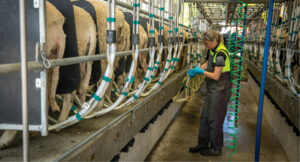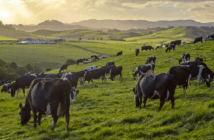Spring Sheep Milk Co are changing the way the world thinks about dairy for the sake of consumers, the environment and local economy.
For the last 100 or so years, the words ‘dairy farming’ have painted the classic image of dairy cows gently plodding to and from a milking shed twice a day.
Now the folk at Spring Sheep are doing their best to broaden our perspectives on dairy farming and introduce New Zealand to the world of sheep milk.
“Sheep milk is a very traditional milk with many modern life advantages” says Scottie Chapman, CEO of Spring Sheep Milk Co. “People have been milking sheep for thousands of years in many parts of Europe and the Middle East, but its only recently that we’ve truly come to appreciate the nutritional benefits of this very easily digestible and nutrient rich milk”.
Historically, sheep’s milk was mostly used in cheese making, but now thanks to better understanding of its unique properties, consumer demand is rapidly growing for ‘non-traditional’ product formats such as yoghurts, drinking milks, baby formula and other nutritional powders & nutraceutical products.
Spring Sheep Milk Co is jointly owned by Pāmu and SLC. These organisations are working together to create good pastures, lead the world in animal welfare practises and deliver high quality grass-fed sheep milk products.
As all good food products do, it begins with nature.
The milk is collected from specialised dairy sheep across farms in the Central North Island from Cambridge to Taupō. It is then transported to Food and Innovation Waikato and spray-dried into powder.
From there the powder is turned into a premium infant formula range, everyday nutrition powders, and chewable tablets.
Scottie Chapman is no stranger to building a trusted agri-business. As an ex Zespri man he knows how to take a brand and scale it up and that’s exactly what he is doing with his latest specialty dairy business venture.
“A number of the people involved in Spring Sheep are ex Zespri people. Zespri is the only brand I know of that has created a genuine global brand out of New Zealand agri-business. Others are trying but no one else has achieved it anywhere near the scale Zespri has,” he says.
“Our goal was to start with a green fields opportunity and create another industry that can do that. With NZ Sheep milk’s environmental, animal welfare and consumer advantages it has the opportunity to become another ‘Zespri’ in the future.”
To achieve this, Spring Sheep are working closely with Food Innovation Waikato. Specialty dairy nutrition products are a lucrative business and because of New Zealand’s geographical distance to Asia, it’s far more practical than liquid milk.
The Spring Sheep milk powder is processed by a state-of-the-art spray dryer sourced from Tetra Pak – a leading international supplier of this equipment.
The plant is highly automated and run by two operators per shift, 24/7. It’s built much like other modern milk drying plants but with a smaller capacity of 500 kgs of finished product per hour compared to 8 tonne/per hour at some other plants.
After the milk is collected it is concentrated using an evaporator. This is essentially a vacuum to boil off the water at a low temperature which reduces the products exposure to temperature.
The concentrated milk is then passed through a spray dryer, where it is sprayed into a large vessel of hot air. This evaporates off the remaining water and passes the powder out the end.
“The main pieces of equipment are custom made, but the basics of the design is relatively standard,” says FoodWaikato business development manager Craig Hoare.
“The equipment is assembled on site by the Tetra Pak engineers. The product is enclosed in machinery through the whole process from milk reception right through to being packed out as a powdered product.”
This machinery was chosen because it allows flexibility in processing and control of the temperatures the product is exposed to.
“This allows us to influence the properties of the finished product. For some applications a high temperature treatment is beneficial, for others it is advantageous to keep the heat treatment as mild as possible. The FoodWaikato dryer has the ability to control the composition of the final milk powder, to adjust the fat and protein content. There is also the ability to add powdered vitamins and minerals, and if necessary even oils to produce an infant formula base.”
Over the years the requirements around hygiene have changed. Something that is especially critical when making food for infants.
“Standards in the dairy industry have increased greatly, and new bacteria have been identified that can cause problems with very young consumers. These pathogens require a great deal of focus to control,” says Craig.
A new spray dryer, which Spring Sheep will have access to, is currently being installed and is expected to be operational by April 8.
Scottie believes it’s time New Zealand branches out from its reliance on cow dairy farming.
“With the advent of sheep milking becoming commercially realistic, what we’ve got now is the ability to convert cow dairy farms back to sheep farms. There’s a whole lot of environmental benefits around that as well. It’s a much more sustainable opportunity for us to compliment cow dairying.”
To the folk at Spring Sheep, sheep milk farming isn’t about making a product and then convincing consumers they need it. It’s about supplying consumers with something they want. And that something is high quality, sustainable sheep milk nutrition products.
“Our job is to make sure we make products of the highest value so we can pay our farmers and suppliers the highest amount of money to make it sustainable. High value nutrition products such as premium Infant Formula.
“Luckily in New Zealand, and around Waikato especially, we have the amazing ability to dry nutritional products of quality.
“Now that we have got scale and experience, we are going into infant formula. The reason we are doing that is because the most precious consumers in the world are babies. Breastmilk is their sole source of nutrition. They are not eating anything else and if an infant is unable to receive breastmilk for any reason, it’s absolutely imperative they get the best available alternative there is.”
These young consumers represent an opportunity to provide “the world’s most discerning customers with the most discerning product,” says Scottie.
Both Craig and Scottie are optimistic about the future of the sheep milk industry.
“Bovine milk will continue to be the largest milk,” says Scottie. “It’s logical and it’s easy to get hold of and it’s got very sophisticated supply chains.
“Sheep milk is coming in as the market fragments into more and more niche products. Digestion is becoming such a big issue so you’re going to find alternative dairy, such as goat milk and sheep milk.
“It’s certainly going to become an industry and it’s going to become a player that compliments cows milk both in the farming sense in biodiversity in New Zealand and for the consumers. We are pretty excited about the future opportunities of the category.”





























































































